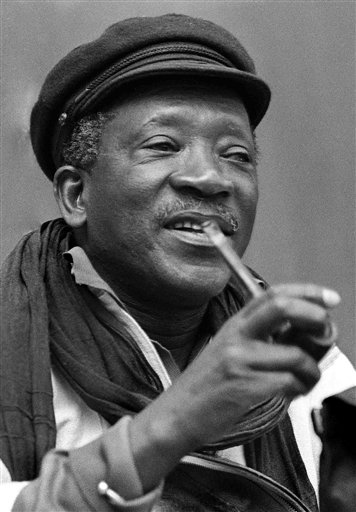Ousmane Sembene: From seasick fisherman to founder of African cinema
By Milos Stehlik

Ousmane Sembene: From seasick fisherman to founder of African cinema
By Milos Stehlik
Son of a fisherman, brick layer, African soldier in the battle to liberate France from the Nazis, dock worker, novelist, filmmaker: an abbreviated summary of the incredible life of the founder of modern African cinema, the late Ousmane Sembene. He couldn’t fish with his father because he would get seasick. Denied higher education, he learned by reading and going to movies at night in Dakar.
Unable to find steady work in postwar Senegal, he got to Marseilles as a stowaway. Loading cargo on ships ended in a back injury. He started to write, mostly from his own experience as a Senegalese immigrant. At age 40, Sembene had an epiphany: the people he most wanted to reach – the working and underprivileged classes of Senegal – were illiterate. He then knew he had to make films. He applied for scholarships, then studied in the Soviet Union.
Sembene’s first films were shorts (the incredible Borrom Sarret), then a feature: Black Girl. A Senegalese girl works for a French couple in Dakar. The couple is repatriated back to France, settles in Antibes and sends for her. The film opening shot shows the girl disembarking, proud, looking forward to a new life. This, of course, turns out to be an illusion. The couple’s living standards in France is much lower than in Dakar. The girl is forced into virtual servitude as housekeeper, nanny – often unpaid. She now belongs to the Diaspora of the immigrant underclass. The 1966 film could just as well happen today in Los Angeles, Phoenix or Miami.
Prior to meeting Sembene, I always conceived of two principal reasons for making films: money or ideology (or personal statement). Sembene’s reason represents a third way: films for people who can’t read.
Sembene’s nine feature films made during his lifetime (Black Girl, Mandabi, Emitai, Xala, Ceddo, Camp de Thiaroye, Guelwaar, Faat Kine, Moolade) all address inequality, disparity or injustice, though not necessarily in expected ways. Xala, based on a Sembene novel, deals with a successful member of the new, corrupt African bourgeoisie – lavishly enjoying his new European clothes, cars, house, multiple wives – which benefit him. As he marries his third wife, he finds himself impotent. He then turns to his native village and its healer, to remove the curse. Moolade, Sembene’s last feature, is powerfully addressed to African women, showing how together, women can overcome the practice of female circumcision.
Cinema in Africa is, for the most part, not African, but owned or dominated by its former colonial powers. To get his films shown, Sembene often traveled from village to village, film cans in hand, setting up a generator and projector in remote places. Like much of African cinema, Sembene’s films are not easily available – you may have to search or wait to see them. Each of them is worth the effort.
This post is part of Worldview’s occasional series Images, Movies and Race, produced in conjunction with WBEZ’s Race: Out Loud series. Film contributor Milos Stehlik hosted a series of conversations on how modern Hollywood films on Africa hide racist overtones within heroic, feel-good stories. You can also hear Milos chat with author MaryEllen Higgins, actress and professor Joyce Ashuntantang and filmmaker Jill Godmilow.